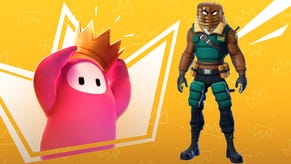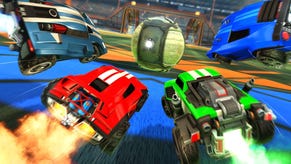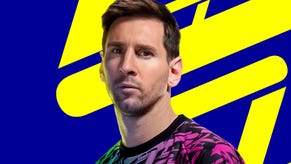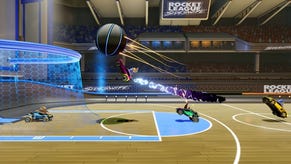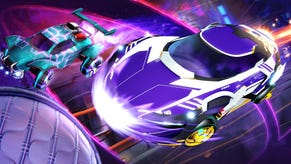Why Rocket League blew up (and its predecessor didn't)
”It's basically the same game.”
Rocket League launched in the summer of 2015 and seemed to be everywhere at once. If you owned a PlayStation 4 and enjoyed having a nice time, you were likely one of six million players who downloaded the game within its first month on PlayStation Plus. Or perhaps you purchased a PC copy instead, in which case, you actually kept the whole thing afloat, whether you realised it or not. It turns out running a successful online multiplayer game is an expensive process.
"I didn't know if we were going to cover server costs," remembered design director, Corey Davis at a recent GDC talk. "Steam covered everything and they pay very quickly, which was important. I can't really imagine what we would have done if we'd shipped only on PlayStation 4 and got that many users."
For most of us, this excellent game of cars and football arrived as a complete surprise. It felt like an event. Out of nowhere, Rocket League was suddenly demanding lunch breaks and converting even the most adamant non-football fans. You only had to see it in action - three friends shouting and laughing together at a TV screen - to get what all the fuss was about. Of course this was going to be a hit. How could it not be? But that's the interesting thing about this story: Psyonix had actually released a very similar game back in 2008, and by comparison, almost nobody noticed.
We're talking about Supersonic Acrobatic Rocket-Powered Battle-Cars, the "worst-named game of all time", said Davis, with some amount of regret. The standard setup is a familiar one, with two teams of three players bashing, flipping and ramming their cars into either an oversized football, or into each other. This game, although not as technically capable as Rocket League, comes from that exact same DNA and yet received neither critical acclaim nor came close to the same level of financial success.
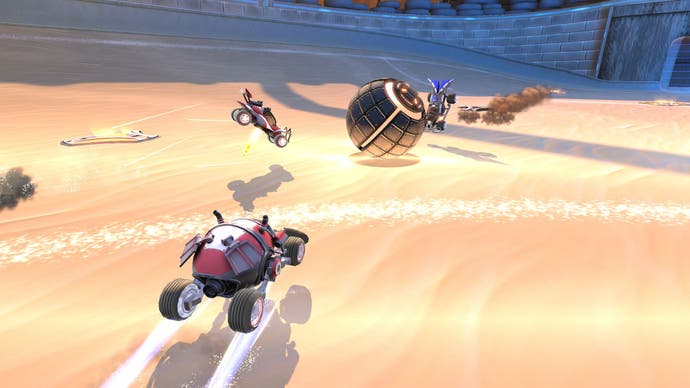
"It's basically the same game as Rocket League," said Davis. "And it got a 67 on Metacritic." This makes it, at least by Metacritic's own ranking system, the 92nd best game to launch on the PlayStation 3 that year. So what exactly happened? What changed, aside from the name, over the next seven years, which meant that Rocket League could manage what SARPBC never could?
Well for a start, the gaming landscape hasn't exactly remained static during that time. Since 2008 we've seen Twitch streaming and YouTube gaming channels take over, with both now attracting huge, incredibly influential audiences. Psyonix claims to have spent nothing on traditional marketing, instead relying on these newer platforms to promote its game more organically. That doesn't sound quite so outlandish today, but seven years ago, it was unthinkable. Seven years ago, community-driven sites like Reddit weren't bringing in 20 million users every month.
"Reddit was absolutely massive for us," said Davis. "The PS4 subreddit picked our game up during the beta and that's what blew us really wide, we think. The GIFs took over. We think that's where it all basically started."
Psyonix's latest game is incredibly GIFable. Unlike, say, a MOBA, which requires an intimate understanding of its characters, item builds and meta game, Rocket League is really just a game about physics. Just like with traditional football, you don't have to play the game yourself to appreciate a skillful shot, or a clever bit of teamplay. And once you'd seen that GIF, or that YouTube montage, or that pro-level Twitch stream, Rocket League was then a very easy sell to anyone who owned a PS4 as the game launched. The console's library was still looking a little sparse and, more than that, if you were a PS Plus subscriber, Rocket League was available as a free download.
"I think there's a big question mark on whether this is the right decision for a particular game," said Davis. "It was, we think, for us. Ultimately this was the big spread. We had all this publicity on Reddit and Twitch, but PS Plus broke down those barriers. It allowed us to stay a premium game and have the reach of a free-to-play game."
So perhaps SARPBC was just ahead of its time. We may not have been ready for both rocket cars and football in 2008, but Davis argues that there's more to it than just that. Rocket League, despite being "basically the same game", has a few notable differences. First of all, unlike its predecessor, this game runs at 60FPS and offers dedicated servers for its online matchmaking, which both prove incredibly important to a game as input and latency sensitive as this one.
Those are features that Psyonix would have liked to have implemented back in 2008. The developers created Supersonic Acrobatic Rocket-Powered Battle-Cars using PCs that could handle a higher framerate and when they playtested it, they did so using a LAN setup. They'd always wanted their game to hit 60FPS and for the lag to be practically unnoticeable, but aside from the technical limitations of the PS3, there's also a significant cost involved in making that a reality. With Rocket League, the team would go on to double their initial budget and delay its release date by around seven months.
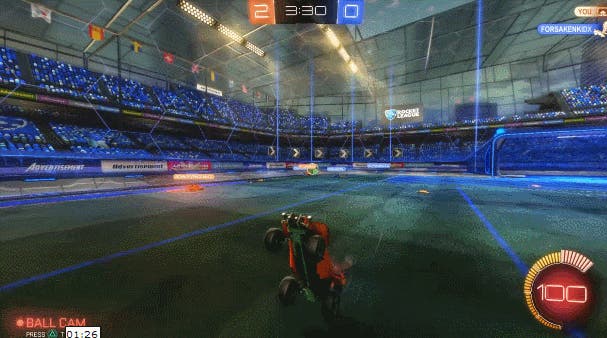
"Not everyone has that luxury," explains Davis. "We bankrolled that by doing contract work, and I can't overstate how hard that is, but how beneficial it was, that we had that time to make the game as perfect as we could make it."
This extra time also allowed for the addition of a party system, which was a new and somewhat contentious idea for its developers. SARPBC hadn't supported this and in the eyes of some members on the team, the potential benefits didn't necessarily justify the extra development time it would require.
"I don't know how to imagine Rocket League without it being easy to party up with your friends and queue," said Davis with the advantage of hindsight. "That's a big part of the appeal".
Then there's the matchmaking system itself, which would need to be reworked from scratch to allow Psyonix's own servers to find and create better matchups. Davis is quick to admit that this "caught completely on fire when it shipped", but believes players have benefited hugely in the long run. Once again, this took time and it took money. There's a strong argument to be made that those are two of the most important factors to consider when comparing the success of these two games.
So Rocket League, I think it's fair to say, wasn't the overnight success that it appeared to be. Aside from SARPBC and a handful of smaller titles, prior to last year, Psyonix has largely been funded through outsourcing work: from Gears of War to Mass Effect 3. This has undoubtedly helped the team pick up some valuable lessons from some of the biggest game developers in the world, but it's also meant that they could keep the lights switched on when their own projects didn't go to plan.
"We cancelled and failed so many games," said Davis.
Psyonix had, it turns out, been working on Rocket League in 2011, although at that point it was still being called 'Battle-Cars 2'.
"That was our gritty reboot," said Davis. "We wasted a lot of time concepting and experimenting with scale, because we had this fixation on not being perceived as RC cars".
That question, as to whether you're controlling a full-sized vehicle in a gigantic stadium, or an RC car in a smaller one, still remains in Rocket League. It's become a popular running joke within the game's community and when questioned, Davis now happily refuses to confirm it one way or another. It's strange, then, to hear that the developers ever saw it as anything other than a way to tease their more inquisitive players.
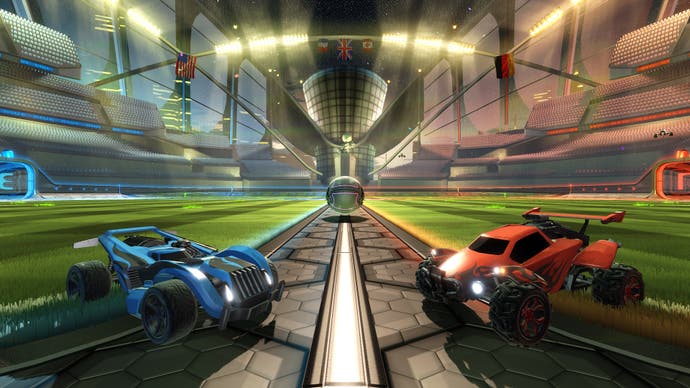
"But we thought it was a big deal," said Davis. "Because we thought to be this serious esport, it needed to clear that these were like awesome, human-sized vehicles. And we wasted all this time on getting scale right, trying to get stadiums that looked realistic for full-sized cars. And it meant that we never hit on a fun play-testable build, which at least at Psyonix, is sort of a death sentence."
And so they dropped it.
They'd also go on to drop Battle-Cars World, which like many games designed over the last five years, was going a bit Ubisoft.
"We thought: why not make it an open-world with cars?" said Davis. "And maybe if you want to drive to a stadium and play soccer, that's just one mode that's available."
An interesting idea, perhaps, although it does seem to clash with the simplicity that SARPBC had championed. It was also "insanely, insanely, insanely out of scope" for Psyonix, admits Davis. They still had something like 15 full-time developers at the time.
"The split focus made it impossible to make any part of the game good," said Davis. "We were trying to serve too many masters at once."
And so once again, they dropped it.
Finally they would arrive at Rocket League and although the team wouldn't settle on that name for some time, they all agreed on the concept: make the game they'd wanted SARPBC to be.
There was perhaps one final hurdle that could have tripped Psyonix on its way to creating this game that would go on to be played by more than 12 million players. For a while, Rocket League was set to be free-to-play. We're not talking about PlayStation Plus here, but across the board.
"This is mid-2013, TF2 and Dota are kind of killing it," explains Davis. "No-one had really failed at free-to-play on PC yet, so let's just turn free-to-play and money shows up at you door in buckets, right?"
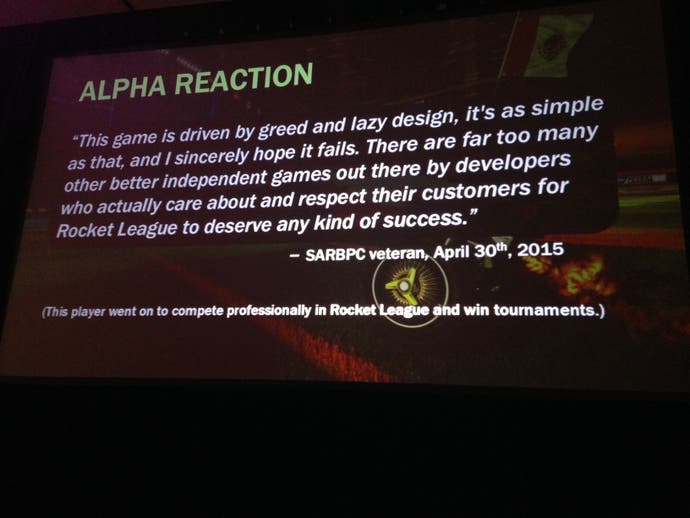
Early versions of Rocket League included a crafting system, which had players collecting resources that were then used to craft various parts for their vehicles. It's not clear if these we're ever intended to be anything other than cosmetic changes (Rocket League, even now, is all about hats), but the system was being designed primarily with monetisation in mind.
It was no small decision for Psyonix to scrap this idea. It meant throwing away a lot of work and further delaying the game's release, but the team was willing and able to take the hit.
"Critically, it freed us up to focus on the game and not free-to-play systems," said Davis. "We felt like developing a game as free-to-play was turning us into monetisation designers and not game designers, we weren't really focusing on what was best for the player, but what was best for monetising the player."
Rocket League was originally set to release in either November or December 2014, but thanks to a new party system, dedicated servers, the team's desire for 60FPS and this drastic change in business model, it wouldn't appear until early July 2015. It may be built around the exact same idea as Supersonic Acrobatic Rocket-Powered Battle-Cars, but the sequel is, undeniably, a better game.
Psyonix did benefit tremendously from forces outside of its control - Twitch, YouTube and Reddit ensured that millions would discover Rocket League - but that shouldn't take away from the fact that its developers were able to scrap ideas that didn't work and take the time to improve those that did. That's the difference.
Also, Rocket League is a way better name.
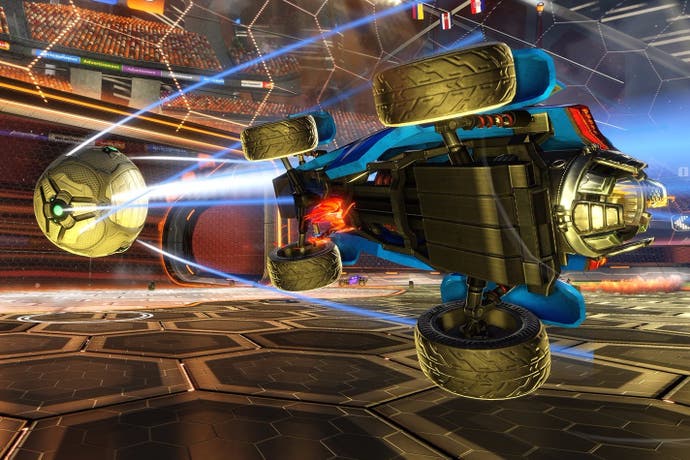

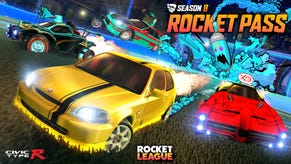
.jpg?width=291&height=164&fit=crop&quality=80&format=jpg&auto=webp)
